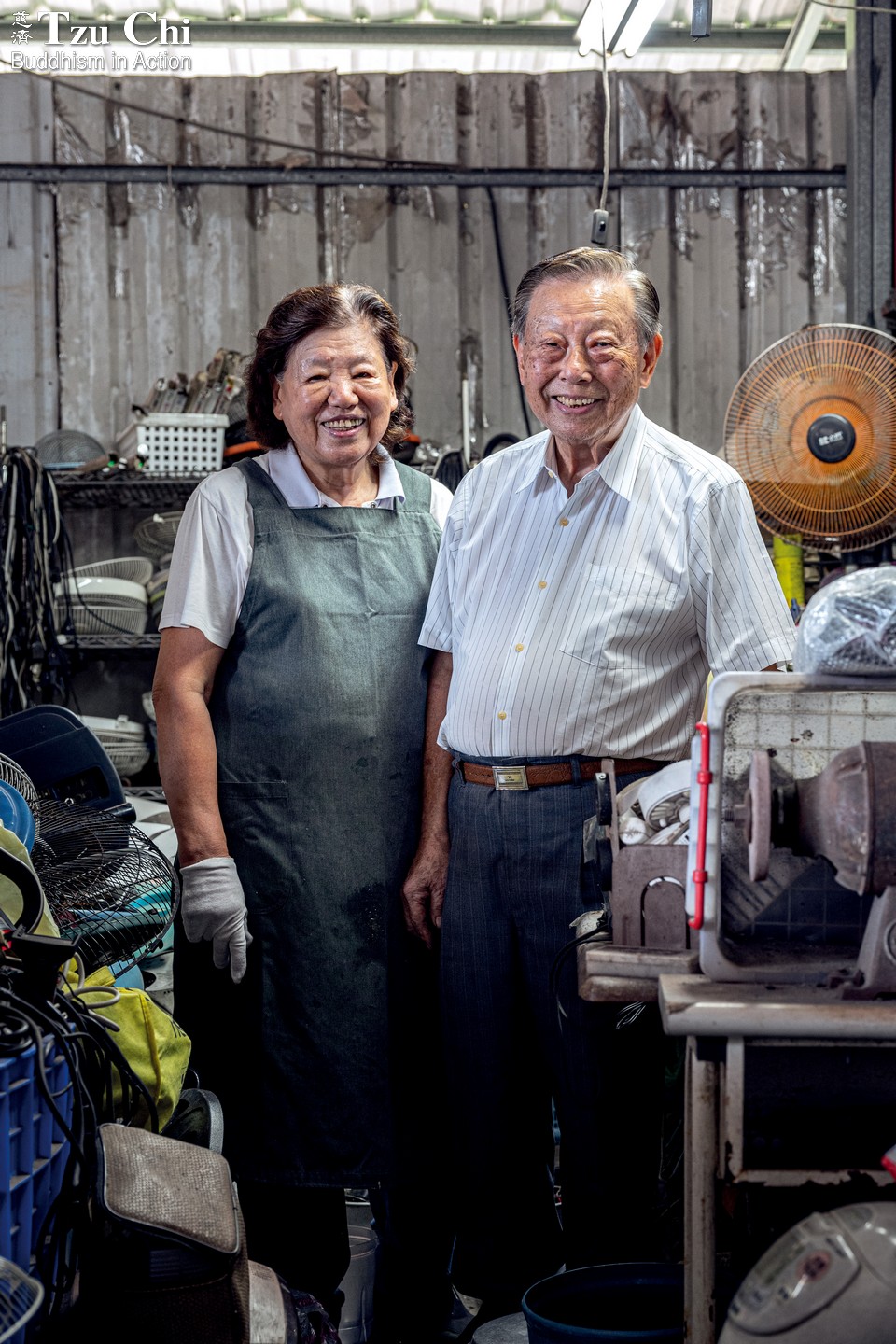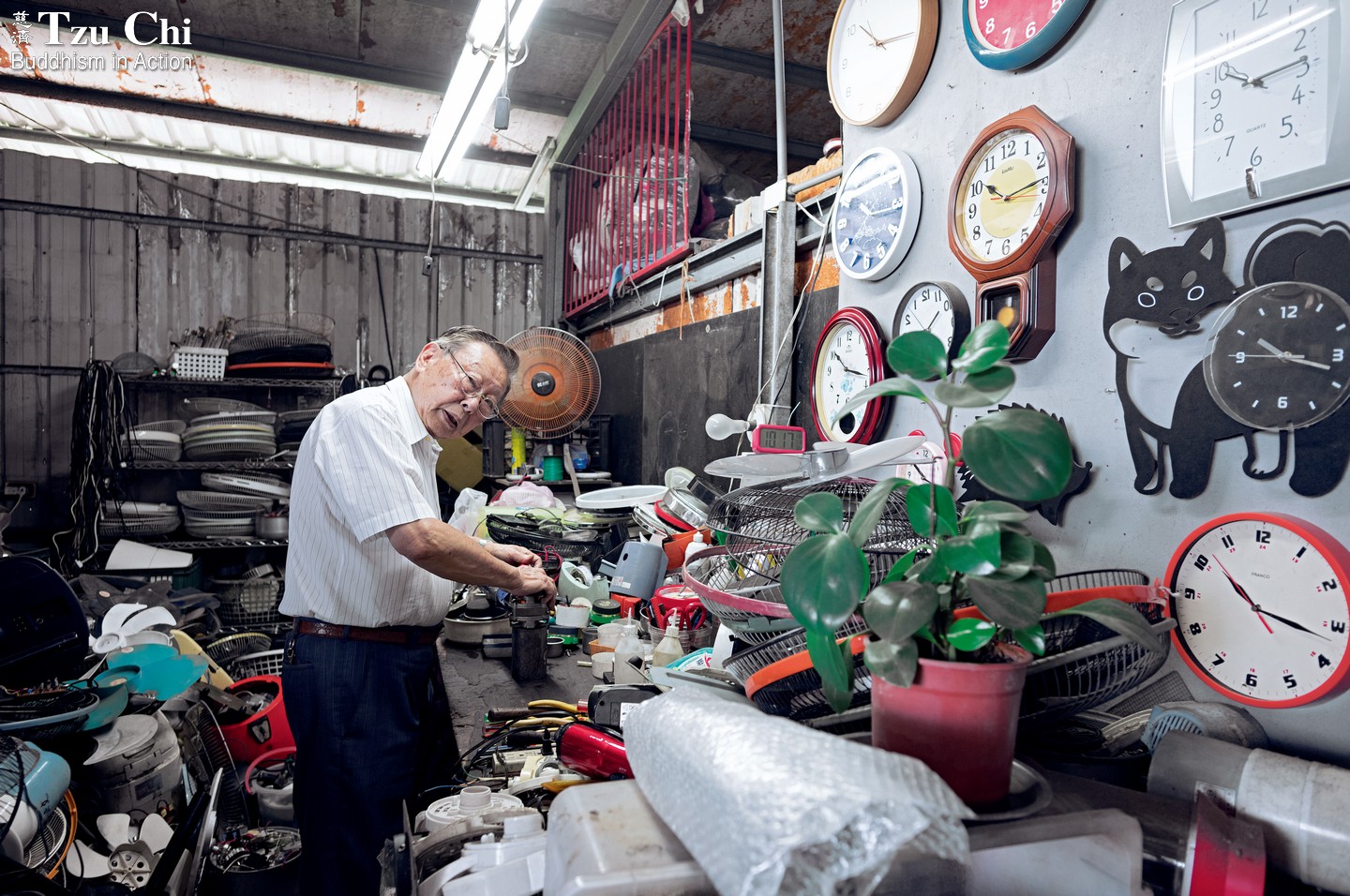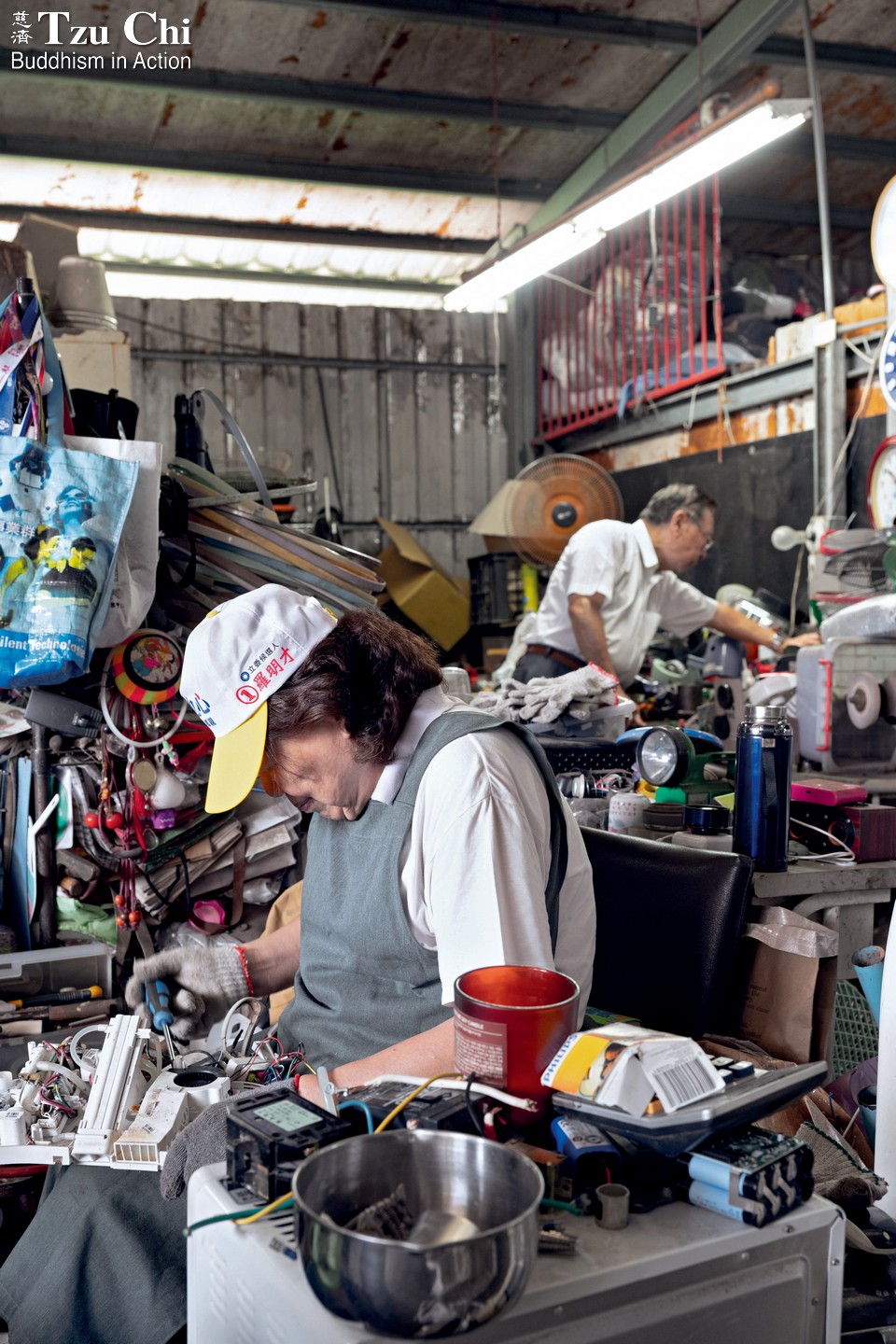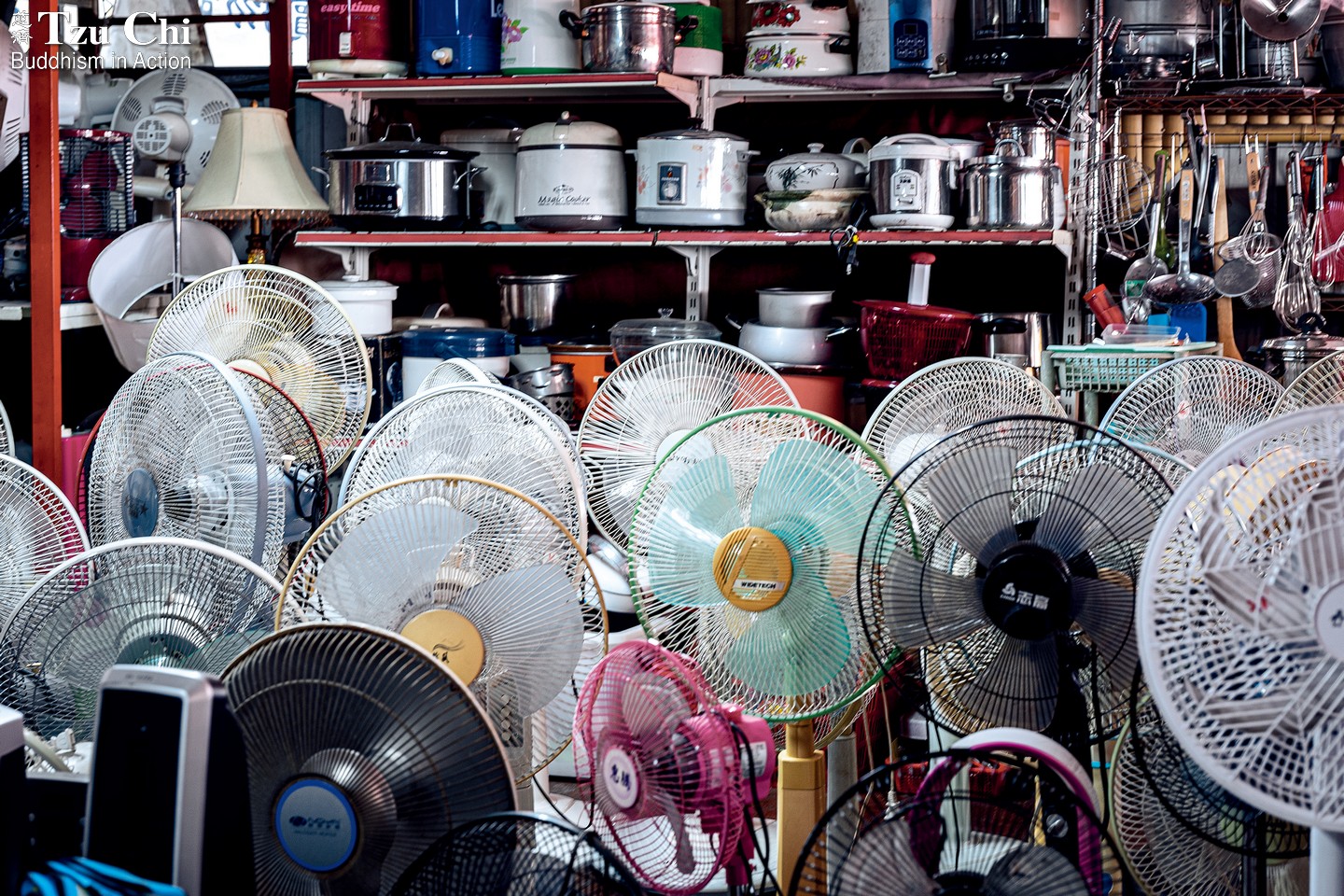By Chiu Chuan Peinn
Translated by Wu Hsiao-ting
Photos by Hsiao Yiu-hwa
Guo Shang-yi finds purpose in repairing old appliances, reducing waste while forming good affinities with those who benefit from his skills.

The screws were loosened and removed one by one until the fan’s back cover could be removed, exposing the motor wrapped in copper wires. Guo Shang-yi (郭尚一), 86, carefully applied lubricant to the motor to reduce its noise while running. “Nowadays, people don’t have the tools to repair appliances themselves, nor the knowledge to do so,” he remarked.
Guo’s workbench for repairing electrical appliances at the Tzu Chi Ankang Recycling Station in Xindian, New Taipei City, northern Taiwan, was cluttered with parts and surrounded by various spare components. In the early days of his volunteering, he primarily focused on fixing fans and clocks. However, as the number of second-hand appliances he repaired grew, space became limited. To make room, he began salvaging usable parts from broken electrical and electronic items for future repairs.
“A cheap fan costs 500 NT dollars, less even than a large pizza. At that price, who’s going to bother getting a fan repaired these days?” he said with a hint of frustration, pointing out how few people are willing to maintain or repair their appliances. With a wry smile, he added, “Those who come to me for fan repairs are either deeply sentimental about their things or have lived through hard times.”
Repaired 2,000 fans in 16 years
Guo’s hair was neatly styled with pomade on the day of our interview. He looked polished and comfortable, wearing a short-sleeved white shirt tucked into black trousers secured with a brown belt. He resembled a craftsman at work or a dedicated factory worker, standing by the workbench where he repairs electrical items.
Guo is a regular volunteer at the recycling station, giving new life to recycled electronics and appliances. Some have dubbed him the “appliance doctor” because he previously served as the factory director of a well-known electronics company. In fact, he had an even longer history as a senior executive at a brake system company. His wife, Wang Mei-sha (王美紗), chuckled, saying, “Many people think he has always worked in repairs, but fixing appliances is just his hobby.”
Guo and his wife became Tzu Chi recycling volunteers not long after he retired at 70. They volunteer five days a week—a routine they’ve maintained for 16 years. The appliance doctor has repaired over 300 clocks and more than 2,000 electric fans during this time, mostly discarded items at the station. Volunteers also bring him electrical items from home to fix. As the number of repaired appliances grew, space in the thrift store at the recycling station became limited. To create more room, fellow volunteer Chen Wen-xian (陳文憲) reached out to nearby Ankeng Elementary School and two rural schools in Yilan to see if they could use the items. So far, nearly a hundred fans and wall clocks have been donated.
With his wealth of experience in manufacturing, Guo views modern industry trends with concern. While repairing fans, he’s noticed that some cheaper models use copper wires as thin as hair; others substitute copper with aluminum, which shortens the lifespan of the appliances. The declining manufacturing quality, despite reducing the cost of electronics, troubles him. He fears people have developed a mindset of replacing rather than repairing, losing appreciation for their possessions.
In contrast to this throwaway mentality, Guo proudly stated that one of his wife’s dowry items was a fan that’s now over 60 years old and still in use. Wang added, “He repairs that fan and replaces parts. It still looks as good as new!”
Guo’s passion for repairing electrical items began in childhood. He recalls being six or seven years old during the final years of World War II. After the war, resources were scarce. Even though his father was a civil servant, providing for a family with eight children was financially challenging.
As the eldest son, Guo began helping with the family’s side businesses at a young age. He remembers milking goats with his grandmother, mother, and aunt to provide milk for tuberculosis patients, as well as running the family’s grocery store with his younger brother during his teenage years—memories that remain vivid to this day.
“The environment you grow up in shapes your character,” Guo remarked, believing that the era of scarcity he experienced fostered frugality in his generation. At least, that’s how he sees himself and the older volunteers at the recycling station.
The simplicity and thriftiness of the past stand in stark contrast to the blatant consumerism of modern society. To Guo, today’s industrial model and rampant consumerism are unfortunate yet inevitable. “If people didn’t waste so much, many would be out of work and couldn’t put food on their tables,” he concluded.

Guo Shang-yi repairs clocks and appliances that volunteers collect for recycling or bring from their homes. If an item is beyond repair, he dismantles it for recycling or salvages parts for future use.
Free community “gym”
Surprisingly, Guo is also not optimistic about the development of green energy. He raised concerns about whether discarded solar panels and electric vehicle batteries can be properly recycled. Shifting topics, he remarked on the growing accumulation of space debris, asking, “Do you know how much space junk is flying around up there?”
While his extensive reading has heightened his environmental awareness and concern, he admits that his commitment to recycling work is not driven by lofty ideals of making the world a better place; instead, he volunteers mostly to stay active and socially connected.
After retiring, he found himself idle at home. Sitting for too long led to severe lower back pain. Moreover, he and his wife spent much of their time at home with little social interaction, which he realized wasn’t a sustainable way to live. Eventually, through Sister You Cai-xia’s (游彩霞) introduction, they began volunteering at the Ankang Recycling Station.
The couple used to hike on Sundays until Wang’s knee pain prevented it. Although they no longer hike to help themselves stay fit, the recycling station became their free community “gym,” allowing them to remain physically active. Volunteers there engage in various forms of “exercise”: some train their arms by tossing large bags filled with plastic into storage, while others stretch by placing sorted recyclables into nearby baskets. Wang, on the other hand, tones her arm muscles by using a hammer to break apart electronic waste for recycling.
Due to his back pain, Guo repairs appliances while standing. Unexpectedly, after three months of this routine, the pain he had experienced from sitting at home disappeared!

Wang Mei-sha is skilled with her hands. She sewed bags from recycled materials in the past, but now mostly focuses on dismantling appliances.
The happiness that seniors truly want
Machines require regular lubrication and maintenance to function optimally. Likewise, our bodies need exercise to stay fit, and our minds thrive on continuous, positive interactions with others. In contrast, Guo feels his social circle shrinking as he ages. Many of his acquaintances have passed away, while others have moved into nursing homes.
He notices that some fellow volunteers at the recycling station have been asked by their children to stop volunteering because their children want them to take it easy and enjoy retirement. While he understands these children’s intentions, he believes that older people need a community where they can find companionship and a sense of belonging. “Old folks need friends!” he says. “And they need something to do to stay happy.”
Fortunately, Guo’s children and grandchildren do not interfere with his and his wife’s volunteer work at the recycling station. He smiles and says, “I’m quite assertive, so my kids don’t dare to step in.” His wife adds that while Guo is not harsh at home, he is a bit of an authoritative figure.
Guo feels that he and his wife volunteering at the recycling station has helped them live independently, contributing to their children’s happiness. The couple are not a burden on their kids. He hopes to continue what he is doing in the days to come. “My volunteer work at the station helps me build good affinities with others: the Tzu Chi brothers and sisters, people who enlist my help in fixing their appliances, and those who patronize our thrift store,” he says. “The remaining value of my life lies in repairing these small devices.”
A quote from a Hayao Miyazaki film resonates deeply with him: “Life is like a train to the grave, with many stops along the way…. When the people who accompany you get off, even if it’s hard to part, you should wave goodbye with gratitude in your heart for the time spent together.” Guo believes that not only should those remaining on the train bid farewell to their departed loved ones with gratitude, but those preparing to disembark should also embrace a graceful attitude. He aims to contribute whatever he can while still alive, and then gratefully wave goodbye when the time comes for him to get off.

Guo Shang-yi finds it difficult to accept the sight of usable items being discarded. By repairing old fans and other devices and giving them new life, he cultivates a sense of warmth and connection with the people who benefit from his work.



